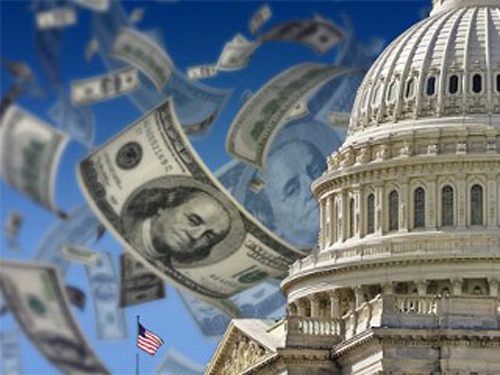
On Monday, after the Obama administration had allegedly tried to block the report from being published, Newsweek published a story by Peter Boyer and Peter Schweizer about loopholes in the nation’s campaign finance laws that enable illicit foreign and fraudulent donations, something which the Obama campaign may be exploiting while raising record sums of money.
By publishing the story, though, Newsweek put into the mainstream media bloodstream the story about the mysterious Obama.com redirect site that could be funneling illicit foreign donations to the Obama campaign and potentially increased the chances that these loopholes will be closed.
As Breitbart News Managing Editor Alex Marlow noted, Newsweek‘s refusal to publish the Bill Clinton-Monica Lewinsky story nearly fifteen years ago gave birth to what is now known as “new media.” Internet pioneer Matt Drudge discovered how Newsweek was actively trying to protect a sitting president and reported on his website then that the magazine had killed a story about an intern having a “sex relationship with the president.”
One can never know if Newsweek eventually decided to run the campaign finance story this week, which hurts Obama, because it feared the new media backlash it would have faced had it not.
By running the story, though, Newsweek assured that Schweizer and the Government Accountability Institute’s research would get even more traction, just as his team’s research on Congressional insider trading did after being featured on CBS’s “60 Minutes.”
On November 13, 2011, Schweizer, the late Andrew Breitbart, and an array of others gathered at what is known as the “Breitbart Embassy” — a building in Washington, D.C. — to watch the “60 Minutes” segment about insider trading in Congress. The segment was the product of Schweizer’s dogged research, implicated Republicans and Democrats, and directly led to the passage of the Stop Trading on Congressional Knowledge (STOCK) Act, which makes it illegal for those in Congress to engage in insider trading.
Schweizer, who also published the book Throw Them All Out based on his extensive and dogged research, discovered Republicans like Spencer Bachus and Democrats like Nancy Pelosi had engaged in shady trades that could have been based on material, non-public information exclusive to those in Congress.
Like with the insider trading investigation, Schweizer and his team were painstakingly thorough in their extensive research and fair, highlighting Republicans — like Marco Rubio — and Democrats whose campaign websites made them susceptible to foreign and fraudulent donations.
Because no campaign in history has been more successful than Obama’s in raising small-dollar donations, though, the GAI report focused extensively on how Obama’s campaign may be illegally soliciting foreign donations. They looked into Robert Roche, who used to own the redirect site Obama.com. GAI discovered Roche lives in China, co-founded a business dependent upon state-owned Chinese banks, and was seated at the head table with Barack and Michelle Obama, Bill and Hillary Clinton, and Chinese President Hu Jintao at a 2011 State Dinner. Roche is also an Obama campaign fundraising “bundler.”
In the Newsweek article, Schweizer and Boyer write that while “there has been no shortage of media attention paid to the role of money in the current presidential contest,” there “has been surprisingly little focus on perhaps the most secretive and influential financial force in politics today: the wide-open coffers of the Internet.”
“The weakness of the current system isn’t particular to any campaign,” they wrote. “It’s a broad reliance on self-policing combined with a lack of transparency.
“Foreign or fraudulent donations might be less of a concern if it were possible for outsiders–the press, the public, good government watchdog groups, or the Federal Election Commission–to independently determine whether they were taking place. But it isn’t.”
This is so because candidates need only publicly disclose the information of donors who contribute more than $200.
The GAI report recommends election officials:
Integrate safeguards to limit the solicitation of money from foreigners by requiring donors with foreign IP addresses to provide proof of U.S. citizenship before they can proceed to the donate page
Immediately require campaigns to use industry-standard anti-fraud security technologies including, but not limited to, the Card Verification Value (CVV) and a rigorous Address Verification System (AVS)
Immediately require all campaigns to retain and disclose identifying information on all online campaign contributions, including those falling under the $200 nondisclosure threshold currently allowed under federal law
Address the threat of “Robo-Donations”: The absence of industry-standard anti-fraud credit card security features render campaigns more vulnerable to so-called “robo-donations.” Robo-donations are large numbers of small, automated donations made through the Internet to evade FEC reporting requirements.
“Until such measures are enacted, however, the integrity of our campaign-donation system will remain mostly in the hands of political consultants and campaign managers,” Schweizer and Boyer wrote. “Is that wise?”
Already, a website launched in conjunction with the report, campaignfundingrisks.com, has been flooded with tips about more illicit foreign and fraudulent campaign donations. As more details are revealed, there may be more calls for this loophole to be closed and Congress may be forced to adopt Schweizer’s recommendations just as it made congressional insider trading illegal after “60 Minutes” and Throw Them All Out aired Schweizer’s detailed investigation into that matter.

COMMENTS
Please let us know if you're having issues with commenting.